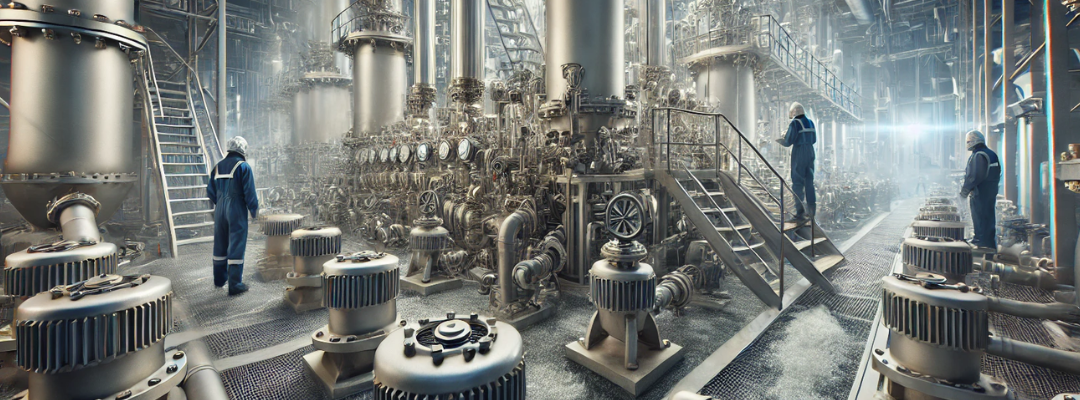Pumps are essential components in industrial liquid filtration systems, as they are responsible for moving fluids through filters, separating contaminants, and ensuring efficient fluid processing. The right pump selection is crucial to achieving the desired filtration results while maintaining operational efficiency. Industrial liquid filtration systems are commonly used in sectors such as chemical processing, oil and gas, water treatment, food and beverage, pharmaceuticals, and manufacturing.
Types of Pumps for Industrial Liquid Filtration Systems:
- Centrifugal Pumps:
- Application: Centrifugal pumps are the most common type of pump used in liquid filtration systems. They are suitable for handling large volumes of low-viscosity fluids, making them ideal for processes such as water filtration, coolant filtration, and chemical filtration.
- Advantages:
- High flow rate capacity
- Continuous operation
- Simple design with low maintenance
- Best for: Water treatment, cooling systems, general-purpose filtration, and low-viscosity fluid filtration.
- Peristaltic Pumps:
- Application: Peristaltic pumps are often used in filtration systems where precise dosing of chemicals or additives is required. They are also ideal for applications that involve highly viscous or shear-sensitive fluids.
- Advantages:
- Accurate flow control and dosing
- No direct contact between the pump’s moving parts and the fluid
- Gentle pumping action for sensitive fluids
- Best for: Dosing chemicals in water treatment, pharmaceutical and food processing filtration systems, and slurry handling.
- Diaphragm Pumps (Air-Operated Double Diaphragm Pumps – AODD):
- Application: Diaphragm pumps are suitable for handling abrasive, viscous, and chemically aggressive fluids in filtration systems. They are often used in filtration processes where solids or sludge need to be filtered out, such as in wastewater treatment and chemical processing.
- Advantages:
- Ability to handle solids-laden fluids
- Self-priming and can run dry without damage
- High chemical resistance
- Best for: Wastewater treatment, sludge dewatering, chemical filtration, and high-viscosity fluid filtration.
- Magnetic Drive Pumps:
- Application: Magnetic drive pumps are ideal for filtration systems that handle corrosive or hazardous chemicals. These pumps are seal-less, preventing leakage and making them suitable for use in filtration systems that require containment of aggressive fluids.
- Advantages:
- No risk of fluid leakage due to seal-less design
- High resistance to corrosive chemicals
- Low maintenance and high reliability
- Best for: Chemical filtration, hazardous liquid filtration, and processes involving aggressive or corrosive fluids.
- Progressive Cavity Pumps:
- Application: Progressive cavity pumps are used in filtration systems that handle highly viscous fluids, slurries, or fluids containing solid particles. These pumps provide a smooth and continuous flow, making them ideal for applications where consistent pressure is needed.
- Advantages:
- Handles highly viscous and solid-laden fluids
- Smooth, non-pulsating flow
- Suitable for abrasive and shear-sensitive materials
- Best for: Sludge filtration, slurry filtration, oil and gas filtration, and industrial wastewater treatment.
- Gear Pumps:
- Application: Gear pumps are commonly used in filtration systems for transferring high-viscosity fluids, such as oils, polymers, or other lubricants. They offer high-pressure capability, which is essential in processes requiring filtration under pressure.
- Advantages:
- Suitable for high-pressure filtration
- Excellent for viscous fluids
- Compact design and consistent flow
- Best for: Oil filtration, lubrication systems, fuel filtration, and hydraulic fluid filtration.
- Submersible Pumps:
- Application: Submersible pumps are used in filtration systems that require pumping liquids from below ground or from tanks, such as in wastewater treatment, sump filtration, or dewatering applications.
- Advantages:
- Can operate submerged in the fluid being pumped
- High efficiency in deep-well or sump applications
- Suitable for handling dirty or solid-laden fluids
- Best for: Wastewater filtration, sump dewatering, and drainage filtration systems.
Key Factors for Selecting Pumps in Filtration Systems:
- Fluid Viscosity: The type of pump must match the viscosity of the liquid being filtered. Higher viscosity fluids, such as oils or sludges, require specialized pumps like gear pumps or progressive cavity pumps.
- Flow Rate and Pressure: The pump must be capable of handling the desired flow rate and maintaining the necessary pressure to move the liquid through the filters.
- Solids Handling Capability: For applications where the liquid contains solids, such as wastewater treatment, pumps that can handle abrasive and solid-laden fluids (e.g., diaphragm or progressive cavity pumps) are ideal.
- Chemical Compatibility: In chemical filtration processes, the pump material must be compatible with the chemicals being filtered. Magnetic drive pumps or diaphragm pumps made from chemically resistant materials like polypropylene or stainless steel are often used.
- Self-Priming Capability: In applications where the pump is not located directly below the fluid source, self-priming pumps like diaphragm pumps are essential to prevent airlock and ensure smooth operation.
- Contamination Prevention: In industries like pharmaceuticals or food processing, where fluid contamination is a concern, pumps like peristaltic pumps or diaphragm pumps are chosen to minimize fluid contact with pump components.
Applications of Pumps in Industrial Filtration Systems:
- Water Treatment Filtration:
- Pumps are used to circulate and filter water in municipal water treatment plants, ensuring that contaminants are removed before distribution.
- Coolant Filtration:
- Centrifugal pumps are used to filter coolant fluids in automotive and industrial machinery to prevent contamination that could damage equipment.
- Oil Filtration:
- Gear pumps or progressive cavity pumps are employed to filter lubrication oils, hydraulic oils, and fuel oils in automotive, marine, and industrial applications.
- Sludge Dewatering:
- Diaphragm pumps or progressive cavity pumps are used in wastewater treatment plants to filter and remove sludge and solid contaminants.
- Chemical Filtration:
- Magnetic drive pumps and diaphragm pumps are used to handle and filter aggressive chemicals in industries such as chemical manufacturing, pharmaceuticals, and food processing.
- Pharmaceutical and Food Processing:
- Peristaltic pumps or diaphragm pumps are used in filtration systems to ensure contamination-free fluid handling and to dose precise amounts of additives during filtration.

